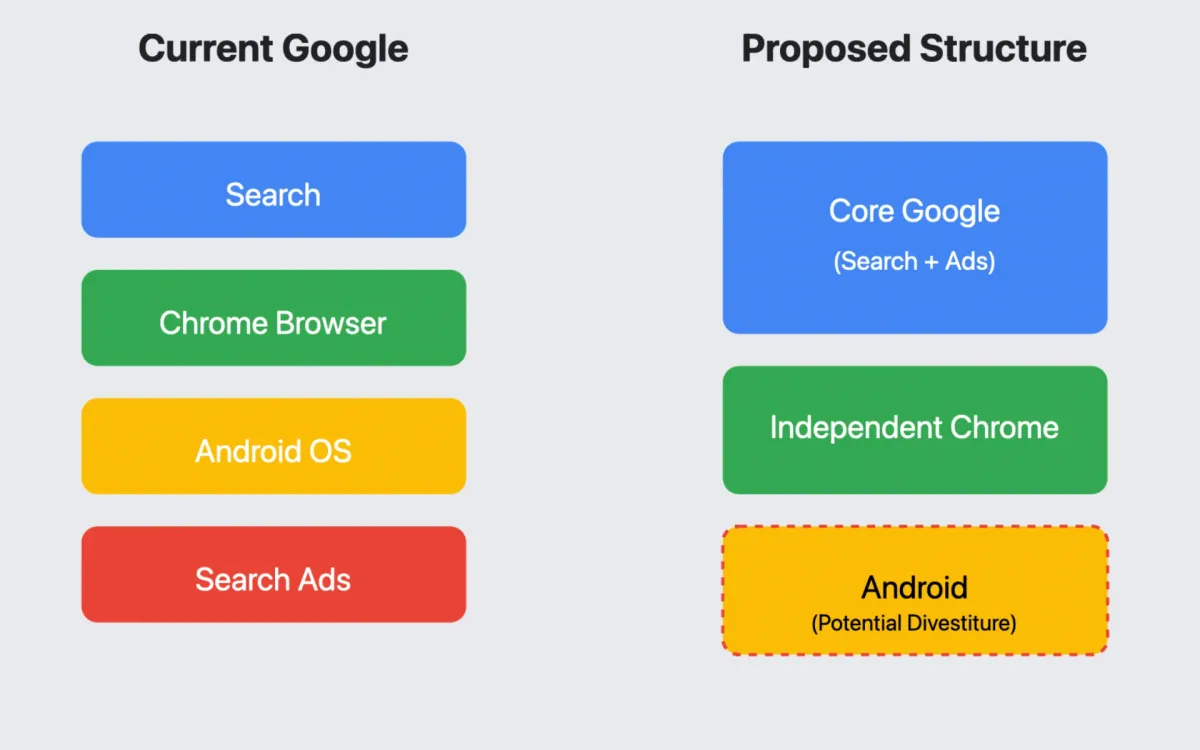
The United States Department of Justice (DOJ) and 35 state attorneys general filed their proposed remedies in the Google antitrust case on November 20, 2024, presenting an ambitious plan to restructure the digital landscape. The filing outlines comprehensive measures to address Google's monopolistic practices in search and search advertising markets, potentially marking the most significant antitrust enforcement action since the Microsoft case of the 1990s.
At the heart of the proposed final judgment lies the court's finding that Google is a monopolist, and it has acted as one to maintain its monopoly over both general search services and search text advertising markets. The filing draws upon longstanding antitrust precedent, including United States v. Microsoft Corp. and United States v. United Shoe Machinery Corp., to justify a sweeping set of remedies aimed at restoring competition.
The most striking element of the proposal is the mandatory divestiture of Google's Chrome web browser. According to the court documents, Chrome has "fortified [Google's] dominance" and represents a "market reality that significantly narrows the available channels of distribution and thus disincentivizes the emergence of new competition." Following the divestiture, Google would be prohibited from re-entering the browser market for five years, ensuring a genuine opportunity for competitive alternatives to emerge.
The proposal takes a novel approach to Google's Android mobile operating system, presenting two potential paths forward. The first option would require Google to divest Android entirely, described as the most "straightforward solution" to prevent Google from using the platform to exclude rival search providers. Alternatively, Google could retain Android while accepting strict behavioral remedies, including prohibitions on self-preferencing and mandatory equal access for competing search providers. If these behavioral remedies prove inadequate, the court could later mandate Android's divestiture.
Central to the proposed judgment is the requirement for Google to share what the court identified as the "essential raw material" for competition: data at scale. For ten years, Google would need to make its search index available to competitors at marginal cost and provide rivals access to both user-side and advertising data, with appropriate privacy safeguards in place. This includes syndicating search results, ranking signals, and query understanding information, specifically targeting Google's anticompetitively acquired data advantage.
The proposal aggressively targets Google's network of distribution agreements, which the court found to be exclusionary. Google would be prohibited from paying for default search placement, including its lucrative arrangement with Apple, and from entering exclusive agreements with content publishers. The company would also be barred from bundling search services with other products or entering into revenue sharing agreements related to search distribution.
To protect advertisers, the proposal mandates increased transparency and control over advertising practices. Google would need to provide detailed performance metrics, enhance keyword matching options, and improve search query reporting. The company would be prohibited from artificially limiting data export and would need to regularly report changes to its auction mechanisms.
The proposal establishes robust oversight mechanisms, drawing from the Microsoft antitrust case precedent. A Technical Committee would monitor compliance, supported by an internal Compliance Officer at Google. Regular reporting requirements and clear processes for investigating complaints would ensure ongoing adherence to the remedies.
Recognizing the growing importance of artificial intelligence, the proposal includes specific provisions to prevent Google from using its control of AI assets to maintain search dominance. These measures ensure equal access to AI-related data and capabilities for competitors while protecting against anticompetitive acquisitions in the AI sector.
The proposed remedies would generally run for 10 years, with specific provisions for immediate cessation of certain practices and phased implementation of technical requirements. Regular review periods would allow for adjustments as market conditions evolve, while clear milestones and deadlines ensure timely compliance.
While the remedies' reach is comprehensive, certain provisions are specifically limited to the U.S. market. For instance, search syndication requirements apply only to U.S.-originated queries, though the Chrome divestiture would affect Google's global operations. The proposal includes mechanisms for international coordination where necessary.
To enhance consumer awareness and decision-making, the proposal establishes a consumer education fund and mandates clear notices about search engine choices. Users would be provided simple processes for changing default search providers, with their privacy protected in any data sharing arrangements.
The filing represents an initial proposal, with a revised version due March 7, 2025. The plaintiffs continue to engage in third-party consultation and additional discovery, reserving the right to modify provisions based on new information and market feedback.
The proposed final judgment aims to achieve several key competitive outcomes. It seeks to enable multiple viable search competitors, reduce barriers to entry, and create conditions for sustainable competition. The remedies should foster innovation and differentiation while preventing the re-consolidation of market power.
For consumers, the expected benefits include increased choice in search providers, better privacy protections, and more innovative search features. Advertisers should see more competitive rates and improved targeting tools, while content publishers would gain better control over their content and fair compensation mechanisms.
The proposal's success will depend on effective implementation, monitoring, and adaptation to changing market conditions. Its comprehensive approach reflects a sophisticated understanding of both traditional antitrust principles and modern technical realities, seeking to restore competition while preserving innovation and consumer benefits.
Looking ahead, the proposal sets the stage for potentially transformative changes in how search and digital advertising markets function. Its impact will likely influence antitrust enforcement in technology markets for years to come, making it one of the most significant regulatory interventions in the digital economy to date.
Key Facts
- Filing Date: November 20, 2024
- Case Numbers: 1:20-cv-03010-APM and 1:20-cv-03715-APM
- Judge: Hon. Amit P. Mehta
- Duration: Most remedies would last 10 years
- Key Structural Changes: Chrome divestiture required, Android divestiture possible
- Geographic Scope: Search syndication limited to U.S.-originated queries
- Implementation: Technical Committee would oversee compliance
- Next Steps: Revised proposal due March 7, 2025

